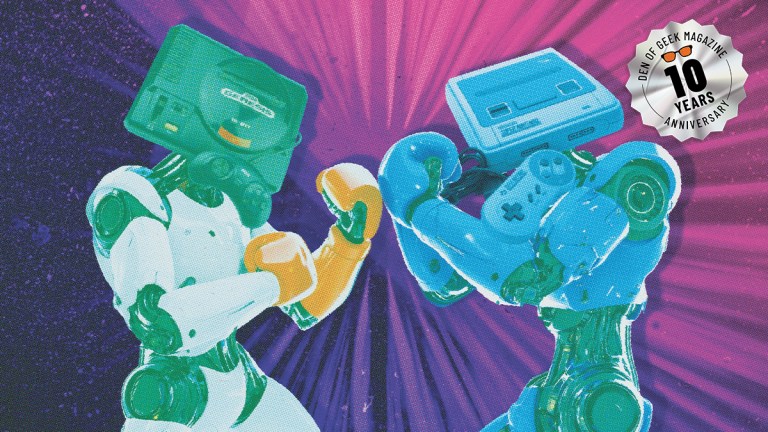The Console Wars Are Officially Over
In a gaming era marked by powerful PCs, generous subscription deals, and a dearth of exclusives - what even is a “console” anymore?

Growing up in the 1990s, my parents refused to buy me a Sega Genesis or Super Nintendo. They thought it was a waste of money since I already had the Nintendo Entertainment System. To folks who had zero interest in video games, there really was no difference. All consoles were just “Nintendos.” After years of complaining and begging, however, I finally wore them down, and they agreed that for Christmas 1995, I could have the brand-new 32-bit console of my choice.
In hindsight, this should have been a no-brainer. The original PlayStation, which had just hit the U.S. a few months earlier, went on to build one of the greatest libraries a console has ever seen. The brand still dominates the gaming landscape three decades later. But this was a time before the internet was widely adopted, and I was just an 11-year-old who wanted to play games like Sonic the Hedgehog, Streets of Rage 2, and Shinobi III, having missed out on the 16-bit era. So, I asked for a Sega Saturn.
It was one of the best Christmases I ever had growing up. I even really enjoyed my first year or so with the Saturn, playing fantastic exclusives like Panzer Dragoon, Nights into Dreams, and Dragon Force.
Then, the new releases started to dry up, and I had to come to terms with picking the wrong console unless I wanted to spend my formative years repeatedly dominating CPU opponents in Virtua Fighter 2. I know I wasn’t the only kid who made the mistake either. While the Saturn was not a huge success, at least I fared better than the kids who ended up with an Atari Jaguar or a Virtual Boy.
But that has always been the risk with console gaming. You’d pick the system that had the games you wanted the most at that moment, knowing full well you would also miss out on the exclusives that ended up on other consoles. Hopefully, though, whatever you selected would still have a deep library for years to come.
It’s not a perfect system, but ultimately, competition in any marketplace is good and should encourage console makers to do everything they can to court buyers with better exclusive games and features. At least that’s how the console space used to work for most of its five-decade history.
But it’s 2025 now, and I can currently play Helldivers 2, a Sony game, on my Xbox Series X, or I can fire up Forza Horizon 5, part of a longtime Microsoft franchise, on my PlayStation 5.
Sega left the hardware market long ago and freely puts its classics and new games alike on almost anything that will run them. That includes the Nintendo Switch 2, which is a great way to play (slightly) inferior portable versions of almost every third-party game on the market, including Indiana Jones and the Great Circle, an Xbox Studios game that’s already hit the PS5 and will be debuting on the Switch 2 in 2026.
We’ve come a long way from the console wars of the ‘90s and 2000s, where exclusives sold systems, and it seemed like a conspiracy theory that Crash Bandicoot might end up on the N64 or Master Chief could take the fight to PS2.
In theory, the big three console makers should have a bevy of exclusives waiting in the wings to court gamers to their respective corners. In reality, modern console gaming means that unless you’re into the ultra-niche Japanese games that only appear on PlayStation, you could just flip a coin, and whatever you want to play will probably show up there eventually. And a lot of those obscure games still end up on Xbox, too, if you wait long enough.
Microsoft has officially resigned itself to bringing almost all of its exclusives to PlayStation over time, and it’s heavily rumored that Helldivers 2 is just the first Sony exclusive to come to Xbox. Development costs have simply gotten too high for big-budget triple-A games to remain locked to one console.
PC gaming, meanwhile, has become the space to play almost all of Microsoft and Sony’s big games. It’s actually not that expensive to build a respectable gaming PC that can compete with the consoles, though optimization can still be an issue depending on the game. With two of the biggest players in the console industry slowly mingling their IPs and circling the PC market, it begs the question: Why even buy a console if nothing is truly exclusive anymore?
The only console maker that seems to understand the console space is Nintendo. Yes, for all of the warranted criticisms about high prices, questionable online infrastructure, and refusal to make older games available for sale, Nintendo has kept in mind that exclusives sell units.
We have yet to see Mario, Donkey Kong, or Link on Xbox or PlayStation. Never say never, but it doesn’t seem like that’s going to change anytime soon. While Sony and Microsoft by all accounts keep throwing hundreds of millions of dollars into games that never recoup their costs, Nintendo has kept development costs reasonable without sacrificing quality.
And it’s made their console business a massive success. The original Switch handily outsold the PS4 and Xbox One, and just a few months after launch, the Switch 2 is breaking sales records.
Essentially, the console war is over. It’s not even really a console space anymore, or at least it won’t be for much longer. While Nintendo seems to be content chugging along with the traditional strategy (and doing quite well at it), Microsoft and Sony look to be transitioning to something akin to pseudo-third-party publishers who sell hardware. And it’s hardware you’ll have fewer reasons to purchase with every passing year.
At least in this new world, no one will make the mistake of picking up the next Sega Saturn for Christmas.
